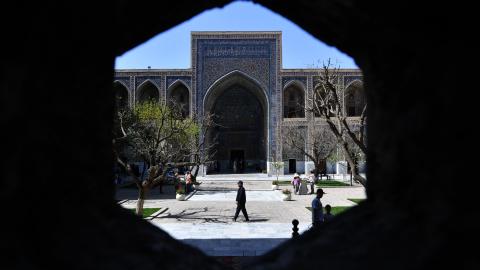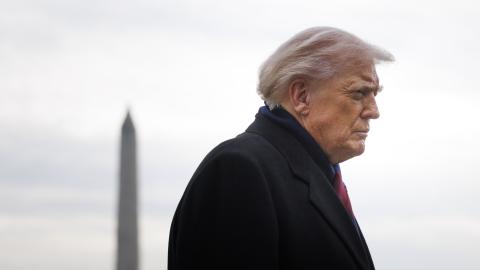As preparations for the American draw down from Afghanistan get underway, there have been a series of articles pushing forth the argument that if India reduced or stopped playing a role in Afghanistan, Pakistan would be reassured and would help the US, and the international community, to stabilize Afghanistan. In itself the argument sounds simple, however, in reality it is not.
Pakistan's fears about India-Afghan ties are both ideological and strategic. As I lay out in my book Explaining Pakistan's Foreign Policy: Escaping India, (Routledge, 2011) Pakistan's leaders crafted an ideology-driven national identity for Pakistan at the heart of which lay both religious nationalism and anti-India sentiment. Hence, Pakistan, a state built on ideology, felt challenged by two neighbors--India and Afghanistan--both of whom shared historical and civilizational ties, seemed hostile to its very existence and emphasized their ethno-linguistic identities.
Further, Pakistan's strategists have always feared a 'pincer movement' or strategic encirclement if India and Afghanistan become allies. To prevent such an eventuality, Pakistan has sought a pro-Pakistan Afghan regime which does not have close ties with India. Any ties between Afghanistan and India have been seen extremely dangerous to Pakistan's very survival.
Not only did Pakistan seek a friendly Afghanistan to prevent encirclement but also for decades Pakistan's military-intelligence establishment sought 'strategic depth' in Afghanistan i.e. an allied territory where Pakistan could relocate arms and personnel in the eventuality of an Indian attack.
As early as the 1950s, Pakistan's first military ruler, General Ayub Khan argued for a federation between Afghanistan and Pakistan. Ayub also championed a regional confederation of like-minded territorially linked Muslim countries i.e. Afghanistan, Pakistan, Iran and Turkey. The belief was this would help Pakistan stand up to India as it would provide strength in numbers and enormous resources.
Pakistani strategists often cited British historian Fraser Tytler who wrote not long after Pakistan's independence: "history suggests that fusion [of Afghanistan and Pakistan] will take place, if not peacefully, then by force." As a Pakistani foreign secretary once remarked "Pakistan and Afghanistan have a symbiotic relationship."
This policy led Pakistan down the path of supporting proxies or assets like the Afghan mujahideen during the 1980s, the Taliban during the 1990s and today an assortment of groups comprising the Haqqani network, Hekmatyar's group, the Afghan Taliban and their supporters.
As early as 1950, India and Afghanistan signed a treaty of friendship. For both New Delhi and Kabul, close ties were seen as important. From the point of view of India, there were not only historical and civilizational ties with Afghanistan but strategic and economic ones. India has always sought close ties with its neighborhood which includes not only its immediate neighbors but countries all the way from the east coast of Africa to South East Asia and beyond.
For Indian policymakers, realpolitik dictated that antagonistic relations with Pakistan meant close ties with Afghanistan were critical. During the anti-Soviet Afghan jihad of the 1980s India did not support any of the mujahideen groups but during the civil war India built ties with leaders in the Northern Alliance, including Ahmad Shah Massoud and Burhanuddin Rabbani.
Today India is one of the leading regional donors to Afghanistan, providing around $2 billion in aid since 2002. Primarily out of Pakistani concern (read 'fear') India has limited its Afghan aid and assistance to areas like infrastructure (building highways, roads and government buildings) health (health clinics and doctors) and education (scholarships for Afghan students to study in India), an area not new in India-Afghan ties. For decades Afghans have studied in India, including President Hamid Karzai and former presidential candidate and foreign minister Abdullah Abdullah.
Pakistan has repeatedly objected to India maintaining four consulates in Afghanistan in addition to an embassy in Kabul. What Pakistan ignores is that these Indian consulates date back to the 1960s (though they were re-established after 2002) and all of Afghanistan's neighbors have as many consulates.
The following speech by India's first Prime Minister, Jawaharlal Nehru, could just as well have been made in 2013 as in 1950: "May I say in this connection that, because of the great tension between Pakistan and Afghanistan over various matters, we are continually being charged with having secret intrigues with Afghanistan and bringing pressure upon her to adopt a policy in regard to Pakistan which she might not otherwise have done?"
In October 2011, India and Afghanistan signed a strategic partnership agreement, the first Afghanistan signed with any country. India has trained some Afghan military officers previously at its defense colleges and is considering an Afghan request to help with training of security forces.
Trade is a key part of India-Afghan ties both for bilateral reasons but also because for India, Afghanistan is the gateway to Central Asian markets and energy resources. Unfortunately, since Pakistan has not yet allowed open transit trade between India and Afghanistan, India has been forced to trade via Iran. Indian companies have invested in Afghanistan and a consortium of Indian steel companies led by Steel Authority of India Limited (SAIL) was recently awarded a block in the Hajigak iron ore mines.
From Kabul's vantage point, India provides a counterweight to Pakistan. Pakistan's strategists have always viewed Afghanistan as their British predecessors did: a buffer or neutral zone for the British, an ally who allowed 'strategic depth' for the Pakistanis. Pakistan's leaders like General Ayub Khan hoped that Afghanistan, Pakistan, Iran and Turkey would form one confederation of like-minded territorially linked Muslim countries. The belief was that this would help Pakistan stand up to India. However, none of the other countries, especially Afghanistan, wanted to be part of any such arrangement or alliance.
Afghan leaders have always resented the Pakistani view that the Pakistanis know what is better for Afghanistan. Afghan support for Pashtun and Baluch irredentism as well as its ties with India has always been Afghanistan's way of standing up to a neighbor they believe interferes in their country. It shouldn't be too difficult for Pakistan to understand what it is like to be next-door to a larger neighbor. And yet, despite Pakistan's fears, Afghanistan has always supported Pakistan, not India, during all the wars India and Pakistan fought and has never taken advantage of Pakistan's vulnerabilities during those wars.
For decades, Pakistan's foreign and security policy has been framed by its India-centricity (or obsession) and every relationship Pakistan has developed has been viewed from the India-centered prism. It is time Pakistan's strategists and supporters reassessed their view of India-Afghan relations and instead of seeing them as a zero sum game, saw them as a positive development.
If Pakistan has genuine concerns then its two closest neighbors--India and Afghanistan--would benefit by assuaging Pakistan. However, if the concerns are based on a simple fear of India then there is little that can be done. States can deal with reality, not paranoia.

















